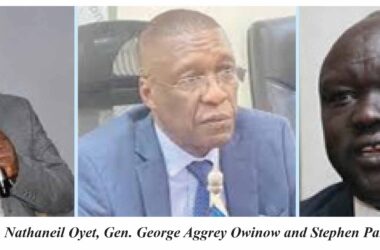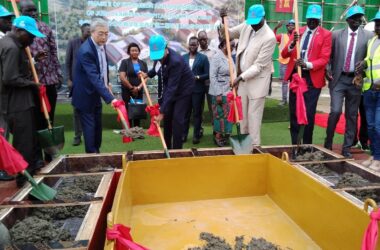By Taban Tom Henry
The Vice Chancellor of the University of Juba has called for amicable solutions to the great differences in the payment of wages in the oil sector.
Prof. Akech who spoke during the inaugural grand launch of South Sudan Chamber of Energy and Minerals (SSCEM) yesterday said that there is need to address the great differences in the wages of the sector and the rest of the society.
“It is time for us to look at that, we need to address the great differences in the wages of the sector and the rest of the society”
“I was critical of the new recruitment model and there were no platforms where we can debate this issue but with this organization, we would have platforms where we can share the ideas, debate the policies and change direction, if need be,” he said.
Akec cited that low-paid civil servants means destruction.
“What is happening to the water policies, the dredging issues and the lack of investment in the energy sector is because the civil servants are weak and if it is weak then we will all suffer and all the sectors will eventually suffer”
“If our civil service is not strong and we talk here about international best practices about conducive environment about the policy that will allow the sector to really grow that will attract investment, then the whole country slots unless the top civil servant has to be paid well, be motivated to design for us the best policies that will keep our country in tag moving,” he added.
The VC questioned why he was critical about the human recruitment manual.
Akec said he carried out a study in the oil sector which revealed that at the beginning majority of the workers were international staff who are expensive obviously because they are thousands of miles away from their families in unknown boundaries with highly specialized skills and they deserve to be paid more.
“Sudan is a good example, wages were not high, it really means if you are not paying our staff, Sudan started with 97% of international staff but by the time they were moving out Sudan has moved to 93% nationals and they were getting an average wage which was not too far from the society but look here mid-level engineers are getting $2,500 and midlevel managers are getting 4,000 dollars while the members of parliament could hardly get 100 dollar, I think we need to look at that on how we can distribute national cakes,” he stated.
Prof. Akec mentioned that some of the areas that need immediate studies and attention is the current model of workers being deployed in the oil field for long period of time at oil-based camps or what they call OBCs away from their families.
“Currently we have a circle approximately 28 days on site and three weeks off site. There are still questions to be asked whether these models are really sustainable and whether they are family friendly and why do we take them for granted as they are?”
He hinted that it would be better off replacing them with proper cities and villages that are applied with proper housing for all workers and their families as well as provision of essential services such as schools, hospitals, education facilities adding that some of these services and facilities could be shared with the host communities not only we revert to provide better for the families, workers and stakeholders.
“I remember in 2013 before the war having to do consultation, I visited the oil fields, I went to Paloch, unity and I consulted with families, I also went as far to Maban, now one only thing that I noticed in Paloch is that the place is really run down apart from the oil based camp otherwise the schools were in tutus and the houses where people are living in are very poor and at the same time they are supposed to be getting 2% of oil and I went to Maban where they were not actually getting anything in that portion and the schools were better, the environment and the houses were nicer,” he explained.
The vice chancellor however said the models whereby engineers go to the oil-based camps and live as isolated communities and not part of the community needs questioning.
“If we turn that model upside down, development will go to those places because the services will be used by everybody, the land is stopped to be a dumping ground”.




